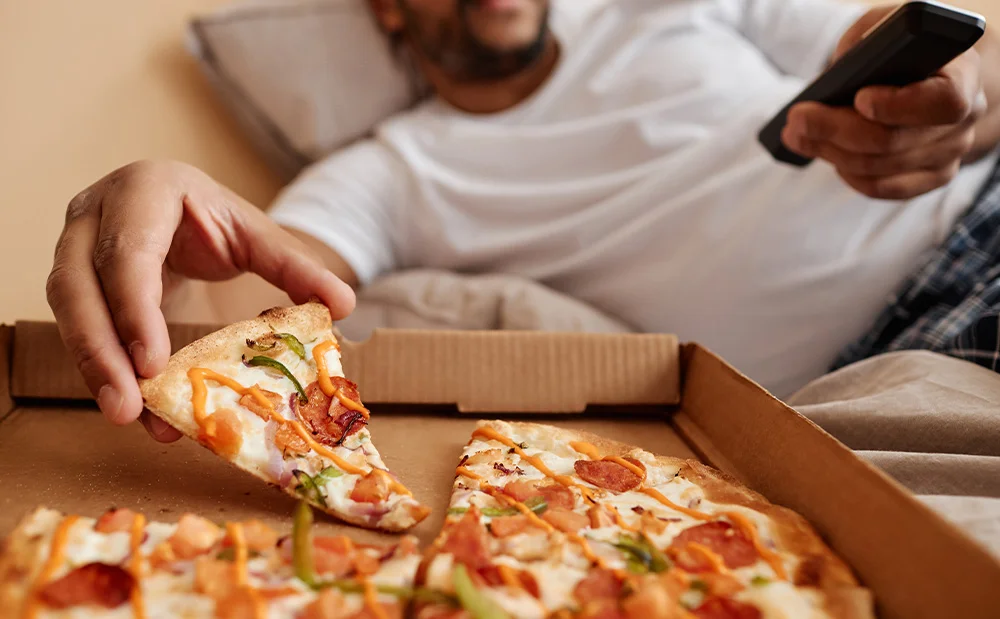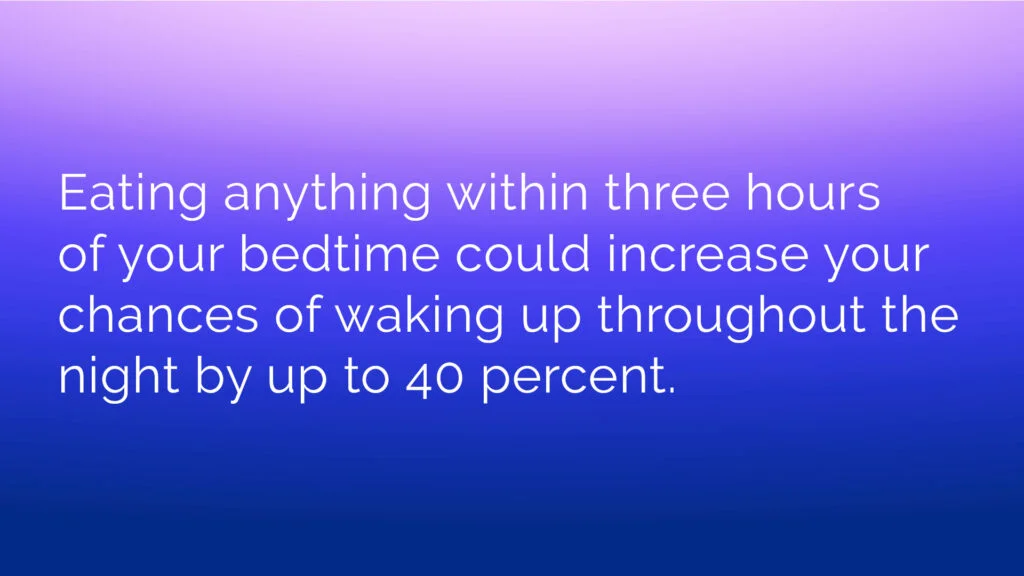
Snacks can hit the spot regardless of the time of day, but we might not consider how a late-night snack may impact our sleep. For some, the idea of skipping a pre-sleep snack may sound like utter blasphemy. So does it really matter if you eat before drifting to dreamland?
As with most questions around sleep, the answer depends on a few…dozen factors. The foods you choose, when exactly you eat them, and your other sleep habits can all affect how well you snooze. This article can help you figure out your perfect nighttime snacking formula so you can avoid any sleep-related snafus.
Long Story Short
- Eating before bed can disturb your sleep and up your risk for heartburn while you’re falling asleep and through the night.
- Our experts recommend eating your last meal at least three hours before lights out and sticking to light, healthy snacks before bed.
- For healthy pre-bed snacks, choose nuts, yogurt, or fresh fruit and veggies — try to avoid fried, greasy, spicy, sugary, or fatty foods.
Is Eating Before Bed Bad?
This answer isn’t quite as simple as a yes or no. Eating before bed can be bad, but it doesn’t have to be. Let’s get the negative news over with first, shall we? First up: heartburn.
“It’s not a good idea to eat before bed because it increases your risk of heartburn and gastroesophageal reflux disease,” says Dr. Leann Poston, MD. Not only can that pesky heartburn make it hard to fall asleep if it sets in before bed, it can also keep you waking up and sleeping poorly all night long. (1)
Beyond heartburn, some data shows that eating anything within three hours of your bedtime could increase your chances of waking up throughout the night by up to 40 percent. (1) And if you eat snacks packed with caffeine and sugar right before bed, these may make it even harder to fall asleep than other snacks, says Poston.

Even after you fall asleep, your pre-bedtime snack choices can continue to disrupt your sleep cycles and confuse your circadian rhythm, also known as your body’s internal clock, Lena Bakovic, a registered dietician, tells Sleepopolis.
We’ll let you know what foods to choose and which to avoid soon, but first let’s talk about when to cut off your evening snacks.
When Should You Stop Eating Before Bed?
You might like a bowl of cereal before you head in to brush your teeth, or maybe some buttery popcorn while you watch your shows. (Or a doughnut or two in bed.) We’re not judging! But it turns out the timing of your snacks can make or break your night of sleep.
“Eating 3-4 hours before bed allows for sufficient time for digestion, helps with feeling satisfied, and prevents hunger before bedtime.”
Lena Bakovic, RD
It helps to understand your body when deciding the best time to stop eating before you hit the sack. Your stomach empties between two and four hours after you eat — everyone’s timing varies a bit, but you probably fall within that range. (1) “Ideally, have your last meal at least three hours before bedtime,” says Poston. That way you won’t go to bed with a belly full of sloshing food.
Worried about going to bed hungry? “Eating 3-4 hours before bed allows for sufficient time for digestion, helps with feeling satisfied, and prevents hunger before bedtime,” says Bakovic.
Of course, your ideal timeline may vary a bit — some studies say you should eat your last big meal two hours before bed, while others say three or four hours is best. (1) (2) In the end, you may need to do some trial and error before you find your sweet spot.
Can Not Eating Before Bed Help You Lose Weight?
If you’re avoiding food after dinnertime, you may think “at least I might lose some weight!” Not a lot of research talks about this specifically, but plenty of studies bring up intermittent fasting, or time-restricted eating, in which you only eat during certain hours in the day. (3)
“Fasting before bedtime does not help you lose weight unless you reduce your overall calories,” says Poston. “[But] if you set a limit to the hours you eat during the day (time-restricted eating) you may consume fewer calories, which will help you lose weight.”
“Some studies [show] fasting, or intermittent fasting, can contribute to weight loss,” adds Bakovic. (5) “However, this is not a safe or effective approach for everyone.” Bakovic recommends checking in with a registered dietitian nutritionist to help you find the healthiest way to lose weight.
When you do eat before bed, the types of foods you choose can affect your weight, says Bakovic. For example, extra carbs from sugar in particular are more likely to be stored as fat when eaten close to bedtime, she says, which may not do your weight goals any favors. (4)
To sum up, limiting your snacks before bed can help you lose weight as long as you’re not making up those calories earlier in the day. (5) (6)
Healthy Snack Choices Before Bed
If downing a quick snack before bed is a nighttime routine you really want to keep, we’ve got you covered. After all, It’s best not to go to bed hungry, especially if that feeling keeps you up. Luckily, you have the power to choose healthy evening snacks to give yourself your best chance at a good night’s sleep.
“If you snack in the evening, choose nuts, yogurt, or another high-protein food,” says Poston. Some other good options are fresh vegetables, fruit, and other whole foods, which may cause less heartburn and other sleep disturbances than deep-fried, air fried, or roasted options. (2)
If you have trouble finding foods that don’t hurt your sleep, a healthcare provider can get you connected with a nutrition expert to discover some excellent healthy snacks for your pre-bed routine.
Foods to Avoid Before Bed
Some foods get up to extra shenanigans in your body when you eat them right before bed, and we’re sorry to say that some of these might be fan favorites.
Poston and Bakovic suggest keeping these on the “no-no” list before bed:
Caffeine can prevent a restful sleep, says Bakovic, and anything high in fat or spicy can also ramp up your reflux and mess with your sleep all night long. (1) (2) You may find some unexpected culprits in your daily diet (chocolate, for example, has some sneaky caffeine in it). (7) Your body will help you figure out what to cut out and what to keep.
FAQs
How long before bed should I stop eating sugar?
Your body takes about two hours to digest sugar, so it’s best to put a hold on sweet snacks a few hours before you want to drift off. (8) Your body is also more likely to store extra carbs from sugar as fat when you eat sweets close to bedtime, says Bakovic.
When should I stop drinking caffeine for a good night’s sleep?
“Some people are more sensitive to caffeine than others, but for most of us eliminating caffeine at least 6 hours before bedtime is a good rule of thumb,” says Bakovic. You may be able to use the six hour rule, but you may need to cut your caffeine earlier in the day depending on your body’s sensitivity levels. (7)
The Last Word From Sleepopolis
If you look forward to your evening snacks, try not to feel discouraged. You don’t have to write off pre-bed food altogether. Try out the snacks our experts recommended, and try to listen to your body cues, too — that way, you can keep your snacks and sleep well, too.
Sources
- Chung N, Bin YS, Cistulli PA, Chow CM. Does the Proximity of Meals to Bedtime Influence the Sleep of Young Adults? A Cross-Sectional Survey of University Students. International Journal of Environmental Research and Public Health. 2020;17(8):2677. doi:10.3390/ijerph17082677
- Pattnaik H, Mir M, Boike S, Kashyap R, Khan SA, Surani S. Nutritional Elements in Sleep. Cureus. Published online December 21, 2022. doi:10.7759/cureus.32803
- McStay M, Gabel K, Cienfuegos S, Ezpeleta M, Lin S, Varady KA. Intermittent Fasting and Sleep: A Review of Human Trials. Nutrients. 2021;13(10):3489. doi:10.3390/nu13103489
- Chandel NS. Carbohydrate Metabolism. Cold Spring Harb Perspect Biol. 2021;13(1):a040568. doi:10.1101/cshperspect.a040568
- Healthy Weight Control | NIH News in Health. Accessed February 6, 2024. https://newsinhealth.nih.gov/2022/12/healthy-weight-control
- Yoshida J, Eguchi E, Nagaoka K, Ito T, Ogino K. Association of night eating habits with metabolic syndrome and its components: a longitudinal study. BMC Public Health. 2018;18(1):1366. doi:10.1186/s12889-018-6262-3
- Weibel J, Lin YS, Landolt HP, et al. The impact of daily caffeine intake on nighttime sleep in young adult men. Sci Rep. 2021;11(1):4668. doi:10.1038/s41598-021-84088-x
- Two-Hour Postprandial Glucose – Health Encyclopedia – University of Rochester Medical Center. Accessed February 5, 2024. https://www.urmc.rochester.edu/encyclopedia/content.aspx?contenttypeid=167&contentid=glucose_two_hour_postprandial Leann Poston. Personal Interview. February 3, 2024.
Lena Bakovic. Personal Interview. February 7, 2024.

























